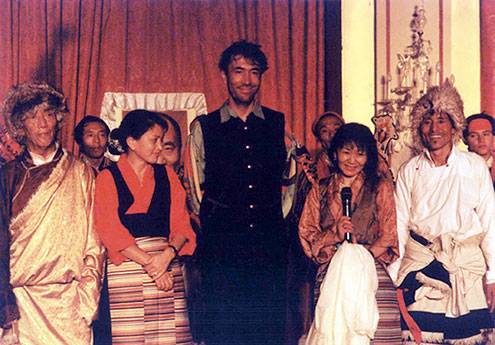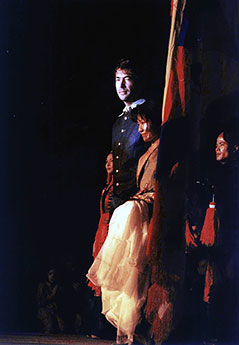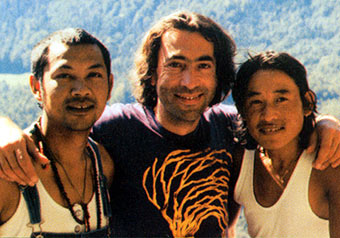TIBET
Opera singer with Goisern
One works hard. Two gentlemen and two ladies from Tibet (all trained singers of their native opera), Hubert von Goisern, Alpinkatzen keyboarder Stefan Engel and sound technician Wolfgang Spannberger work at a single project: Classical Tibetan music receives a new outfit with great feeling. For 14 days in Goisern's studio he is producer of the CD of the four Tibetans who are his guests. Sonam Phuntsok is one of them. All are members of the Tibetan Institute of Performing Arts in north India. There one carefully retains that which China suppresses in their homeland - the age-old art of opera. However there is also a well-known problem in this country. "The children hear an ever-decreasing amount of traditional music", says Sonam. The contact with the Goiserer and the knowledge of his success seemed energising: "we also want to make the old music audible for the youth again." P.S.: We briefly listened in: The Tibetan-Alpine project is running splendidly.
"Tibetans are denied all rights"
Hubert von Goisern plans "Band Aid" for Tibet
It had been a childhood dream, but the Austrian artist Hubert von Goisern's journey to Tibet developed into a nightmare: "The people have to live under conditions that we know from the time of the Nazis. Their language, their faith and their culture are repressed." That is why he now wants to organise a "Band Aid" concert on an Austrian level, based on Bob Geldof's model. As if confirmation of his report, on Wednesday, the Chinese authorities who have oppressed the country for 46 years, published a set of statistics that since the beginning of the action "Harder Beat" in Tibet in May, thousands of people have been executed. Nobody is safe. "There are surveillance cameras everywhere in the capital city Lhasa. You speak to the population and a policeman is immediately on hand. Monks are arrested. Woman have compulsory sterilisations. Children are locked up," said Hubert von Goisern after he had visited the region with exiled Tibetan Tseten Zöchbauer. "Never was the readiness to resist as big as it is now," said Zöchbauer of the consequence of the brutal rule from Peking. How Austria's government avoids the problem - just in order to get hold of economic orders - is dreadful, complains the duo. Recently a resolution proposal from the Liberal Forum requiring China to respect basic rights in Tibet, was taken from the agenda. Hubert von Goisern: "I am ashamed of my country."
"I am ashamed of our politicians"
Today in Land der Berge - Hubert von Goisern in conversation about his journey to Tibet
Hubert von Goisern was far, far away. He grew up himself in the mountains and devoured Heinrich Harrer's Seven Years in Tibet. With Tseten Zöchbauer, representative from Save Tibet, the temporarily retired alpine rocker travelled for 6 weeks through the country occupied by China. In the exclusive interview with the Land der Berge team the Goiserer assesses the situation with tears in his eyes: "Dreadful, dreadful".
Tseten Zöchbauer, born in Tibet, grown up in the West, entered her homeland for the first time in 35 years although she is on the black list of the Chinese occupying forces. Together with Hubert von Goisern, she presented the Austrian tour of the exiled dance and music group TIPA in spring.
In the ORF interview, which will first be put at the disposal of OÖN, the upper Austrian seemed fascinated by the countryside and horrified by the political situation, after his return two weeks ago. "It is such a beautiful country, the people are so good because of that. The pleasure, the ecstasy, the tears lie so close together. It is incomprehensible how the Western world reacts to this situation, that they totally ignore it, that here a nation has been repressed for 50 years. I am ashamed of our politicians who do business with a regime that lies, cheats, murders and tortures." Hubert von Goisern alludes to the fact that Austria put obstructions in the way of the Dalai Lama's visit, but had courted a Chinese trade delegation in the hope of a billion orders, despite the violation of human rights.
Does Tibet still have a chance of being free? "A nation that stands up for its freedom without force, must simply triumph," says Goisern, who also had an audience with the Dalai Lama in his Indian exile: "He is a simply wonderful man, who radiates peace and faith."
About the Chinese regime: "You cannot believe in the system. In my heart, I have always been a bit Communist, Marxist. Nothing remains of that. The Communism that I saw there turns people into marionettes. They give up thinking and living."
About the mountains: "The quiet there lets us feel how wonderful the world is and how tiny and unimportant we are in this world."
Hubert von Goisern and the TIPA in 1996


These photos were taken in 1996, when Hubert von Goisern co-presented a number of Tibetan Institute of Performing Arts (TIPA) concerts in Austria with Tseten Zöchbauer.
Hubert von Goisern: It's Tibet's turn now
Hubert von Goisern is well-known by connoisseurs of the Austrian music scene as a crossover genius. He gained their attention with the CDs Aufgeigen stått niederschiassen and Omunduntn - he combines folky music with rock and has thus "invented"a new music style, which is meantime readily copied in the . He does not let attributions such as folk music or pop music apply, as according to his personal, human and musical experiences, these don't exist in this form either. But not just on the "conventional" music floor has he hitherto been able to show his ability: He composed the film music to Vilsmaier's cinema success Schlafes Bruder, the film was promptly nominated for the Foreign Film Oscar. Actually he has withdrawn from the music business - in order to, as he says,"create something new again".
At present, he is appearing as presenter for a series of events in the context of the Tibetan New Year. The organiser of this tour, which was to be seen in some cities in Austria over the course of a week, is the Save Tibet Association. Among others undertaking patronage for this event are Francesca and Karl von Habsburg and Heinrich Harrer.
On 29th February 1996, Sabine Januschke posed Hubert von Goisern some questions on his activities regarding Tibet:
Can we count on the fact that Austria has a Richard Gere too now?
It always depends on media interest - if it is great, you can do something, but if the media is not interested, you can't jump around like Rumpelstiltskin either, they wouldn't pay attention to you and they wouldn't take you seriously either. I'm just beginning to take an interest in it.

Sonam, HvG and Jamjang
How did you come to Tibet - what is your relationship to Dharma?
Buddhism has always been of interest to me, the mentality the people have - for some years I have used meditation. Apart from that, I am a 'Bergler', that is, I came via mountains to Tibet. They always interested me and fascinated me in a certain way. As a child, I was very impressed with the stories about the country from Heinrich Harrer. Through Harrer I progressed to the Dalai Lama. I mean, I am a child of the west, I don't want to become a Tibetan. But what always surprised me and what was also somehow crucial, was this sign of gaiety. The people are always so merry. You will never find anyone who complains about his fate, or wails about how things are in the west. There the people have everything and in the morning they have no reason to get up and just complain about how bad everything is for them. I was in Dharamsala and saw street children - who really have nothing, who live by selling cigarettes, or the like, but they are always in a good mood and are always happy. I would rather have a good laugh than be in a cross mood. I have that in common with the Tibetans. Now I have found some things out for myself, and met and seen some Tibetans and naturally I would like to give something back again.
Key words "giving back" - this giving back - what is that, what will it be? Do you already have an idea, how you want to give something back?
I cannot say in concrete terms yet - I don't know yet. I would like to make people aware of the things happening in Tibet. I mean, Tibet is a piece of our world and one must do something for it - if the country didn't exist any more, then the world would be a bit poorer. I admire the Tibetans, they are always so industrious, like the ants. But the Chinese too. Yes, the Chinese. They're poor dogs too, who are governed by a few senile old men, who lost contact with the people, the youth, a long time ago. I mean, I have great respect for the old people, but when a government, a country is led only by old people, then things can only go wrong, then it is a spineless society.
It's not so much better for the Chinese population than for the Tibetans, apart from the fact that they did not become, for instance, the radioactive waste dump of another country. The Chinese are religiously totally single-minded, which I think makes most problems.
Yes, the Chinese - they are single-minded. They raised communism to religion. You must imagine it: they made Mao their idol and prayed to the pictures like a God. The Tibetans have never done with the Dalai Lama, what the Chinese did with Mao.
I have a relatively intimate question now - what about a teacher, do you perhaps have a teacher? I ask this question, because we are from a medium, which naturally bears interest in such affairs.
I lived in Vienna for seven years and in the course of this time I came to know and highly regard many Buddhist teachers. I was in search of a guru. The Dalai Lama is crucial there for me - that said, he is no guru, he has only one function which he fulfils, a karma, which he took on himself. Hats off for his way of dealing with it. I am someone who is in the public eye time and time again, and I can only say that it is difficult to manage. It's great how he does it.
I had teachers myself only for short times - in music too - I got as much as I could process and when it was too much for me, I marched to the next teacher. I never wanted to be like my teachers, in spiritual terms too. I mean, I'm someone who's in the public eye; some people make me an idol - I can't get on with being an idol and sometimes I'm a little brusque too.
Will we be able to see you in the future as - as usual - an individual fighter for Tibet and its people, or rather together with organisations, e.g. Save Tibet?
I am engaged in various regards - I have projects in Africa, and also in Austria to run. The children are most important for me. Otherwise I step in when I see the need arises. For the moment Tibet is most important - I want to fight against the unfairness. Yielding brings nothing! Because misuse of power brings no fortune either. Rather be poor and happy, than rich and no perspective. That is the realisation.
Your future commitment...?
... will certainly only be possible in the context of art. I said, I won't return to the stage, but when it is important, like here, then I simply do it. I don't set up stubborn rules. I am, for example vegetarian, but when I go somewhere, where I'm given meat, like at home, where there's schnitzel, then I just eat it - I don't lean back aghast and announce: I'm vegetarian, I won't eat that!
Last question: Will you be in Brussels with the European-wide demonstration on the occasion of the first rebellion of the Tibetans against the Chinese occupation?
No, we are on tour in St. Pölten then. But there's a demo in Vienna too - the main thing is that you go and do something and who knows, perhaps I'll get the mayor of Bad Goisern to hang up the Tibetan flag on 10th March.
That would be a good start; thanks for the interview!
